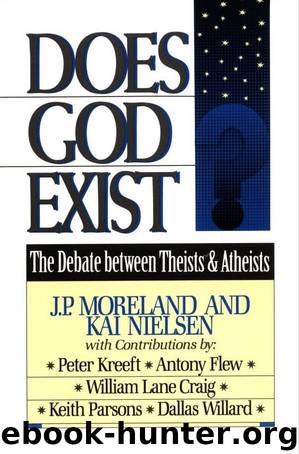Does God Exist? by J. P. Moreland

Author:J. P. Moreland
Language: eng
Format: azw3, epub, mobi
Published: 2009-07-21T02:43:00+00:00
As a university student in 1968, I met Jesus Christ personally and He changed my life. I have had close to two decades of walking with Him and fellowshiping with Him and falling more and more in love with Him daily. He has given me a power for life that I did not know before, and I have had personal experiences of Him.
a. I have to say that, as evidence for the truth of the religious beliefs that it is offered to support, Moreland's appeal to his "personal experiences" strikes me as absolutely grotesque. So, in hopes of thereby slightly softening the harshness of my rebuttal, I will approach it a little indirectly, by way of a consideration of his treatment in "Questions and Answers" of what are now normally called Near-Death Experiences (NDEs). He says, "I'm not certain what to make of these, but I'm not going to reject them a priori."
Moreland's mistake is to assume that anyone refusing to accept these experiences as evidence for the existence, detachability, and post mortem survival of an essentially incorporeal, substantial soul must thereby and necessarily be giving the he to all claims to have had NDEs.
To appreciate why this assumption is false, we need to develop the fundamental distinction between two senses of the word "experience." In the ordinary everyday sense-that in which a farmer might announce his need for hands experienced in dealing with cows-anyone so experienced must have both knowingly perceived and possess some theoretical and practical knowledge of real, external world, flesh-and-blood cows. But in the peculiar, philosophers' sense-the private as opposed to the public sense-someone might truly claim to have enjoyed experiences of cows without that assertion entailing any actual perception of such ruminants. It would be sufficient to have dreamed of cows, to have suffered hallucinations involving cows, or merely to have had-without prejudice- "cowish" sense-data.
This fundamental distinction once firmly made, it should become obvious that we may consistently concede the complete honesty of witnesses in their testimony about their private experience, while nevertheless insisting that, construed as accounts describing or misdescribing their public experience, their testimony is-partly or mainly or even totally-mistaken. Perhaps, for instance, the patient tells us, quite truthfully, that while she was at death's door, she seemed to herself to be on some kind of trip. Perhaps too she even comes up with information, which she had no normal means of acquiring, about "things that ... happened two blocks away."16 We, however, presumably know that she was all the time lying on her hospital bed, apparently unconscious. So, since any information acquired by a disembodied soul could only be acquired "by ESP," the most economical response, applying Ockham's Razor, would be to say that she must indeed have acquired that illicit information by that putative meansless means but while still motionless in bed.
b. Turning now directly to the passage just quoted from Moreland, it would seem that we also need another distinction: between, on the one hand, the immediate operations and the
Download
Does God Exist? by J. P. Moreland.epub
Does God Exist? by J. P. Moreland.mobi
This site does not store any files on its server. We only index and link to content provided by other sites. Please contact the content providers to delete copyright contents if any and email us, we'll remove relevant links or contents immediately.
The Lost Art of Listening by Michael P. Nichols(7506)
Why I Am Not A Calvinist by Dr. Peter S. Ruckman(4153)
The Rosicrucians by Christopher McIntosh(3519)
Wicca: a guide for the solitary practitioner by Scott Cunningham(3178)
Signature in the Cell: DNA and the Evidence for Intelligent Design by Stephen C. Meyer(3138)
Real Sex by Lauren F. Winner(3022)
The Holy Spirit by Billy Graham(2952)
To Light a Sacred Flame by Silver RavenWolf(2823)
The End of Faith by Sam Harris(2742)
The Gnostic Gospels by Pagels Elaine(2531)
Waking Up by Sam Harris(2460)
Nine Parts of Desire by Geraldine Brooks(2368)
Jesus by Paul Johnson(2362)
Devil, The by Almond Philip C(2331)
The God delusion by Richard Dawkins(2309)
Heavens on Earth by Michael Shermer(2284)
Kundalini by Gopi Krishna(2184)
Chosen by God by R. C. Sproul(2164)
The Nature of Consciousness by Rupert Spira(2108)
